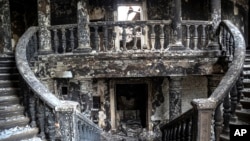The Russian government last week released a “Strategy of State Cultural Policy,” stating goals for the next six years. The plan prioritizes measures to protect “Russian traditional values” from the West’s “pernicious” influence that “cause irreparable damage” to “basic moral and cultural norms.” The plan includes increased funding for efforts to counter “attempts by unfriendly states to undermine the worldwide influence of the Russian culture.”
Russification of Ukrainians who live under the Russian occupation is one the strategy’s main goals. To achieve this, Moscow-founded institutions and schools will be “re-educating” Ukrainians starting, from kindergarten, by teaching “historic truths.”
Among many “historic truths” highlighted in the Russian strategy is the story of Ukraine’s Mariupol drama theater, which it says was “seriously damaged” by the Ukrainian Armed Forces.
"Since the beginning of the special military operation, Ukrainian troops have caused serious damage to iconic cultural institutions, unique historical and architectural monuments, and religious sites. Among them … the [building] of the Mariupol Republican Academic Order of the Badge of Honor Russian Drama Theater," the cultural policy document states.
That is false.
Ukraine used the Mariupol Theater as a bomb shelter, with the word “Children” painted in large white letters on a pavement space outdoors. Russia bombed and destroyed it on March 16, 2022, killing up to 600 Ukrainians.
The Associated Press investigated the bombing and recreated the events of that day from the testimonies of 23 survivors.
“Amid all the horrors that have unfolded in the war on Ukraine, the Russian bombing of the Donetsk Academic Regional Drama Theater in Mariupol on March 16 stands out as the single deadliest known attack against civilians to date. An Associated Press investigation has found evidence that the attack was in fact far deadlier than estimated, killing closer to 600 people inside and outside the building,” the AP reported in May 2022.
AP also debunked the Russian claims at the time that servicemen from Ukraine’s Azov battalion blew up the shelter they had mined. “Not one person doubted that the theater was destroyed in a Russian air attack aimed with precision at a civilian target with children in it,” AP reported.
The Organization for Security and Co-operation in Europe, Human Rights Watch and the U.K.-based watchdog Amnesty International classified the attack as constituting a war crime.
The OSCE reported in April 2022 that up to 1,300 people sought shelter in the Mariupol theater on the day of the Russian strike. At least 300 died in the bombing, while 150 escaped. The OSCE classified the attack as a likely war crime and violation of international humanitarian law.
Human Rights Watch has verified videos showing the Mariupol theater engulfed in smoke and flames after a Russian strike and stated that targeting civilian structures, as in this case, may constitute a war crime under international law.
Amnesty International’s investigation, published in June 2022, concluded that Russian forces committed “a clear war crime” by deliberately targeting the Mariupol theater on March 16, despite knowing civilians were sheltering there.
The report details how two 500-kilogram bombs, dropped by Russian fighter jets, struck the building, killing hundreds. Amnesty’s Crisis Response team interviewed survivors, analyzed digital evidence and used a mathematical model to confirm the bombs' explosive weight.
The investigation ruled out alternative explanations, identifying a deliberate airstrike on a civilian target as the most plausible scenario.
After taking Mariupol in May 2022, Russian forces covertly removed the bodies of the victims, taking them to an unknown location. Moscow has not allowed any independent international investigators to visit the site of the destroyed theater.
To this day, Russia conducts systematic airstrikes on Ukraine’s residential areas, aiming to terrorize civilians, destroy infrastructure and turn Ukrainian cities into uninhabitable ghost towns, AP reported in June.
On October 22, Russian drones targeted a residential area in Sumy, Ukraine, killing three civilians, including a 14-year-old girl, her mother and her aunt. The attack was part of a larger overnight air assault across several Ukrainian regions.






